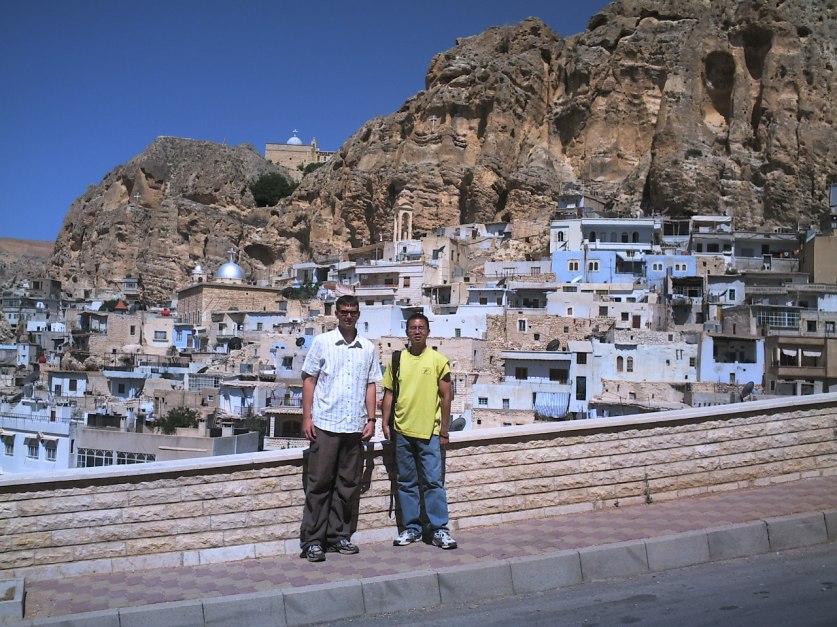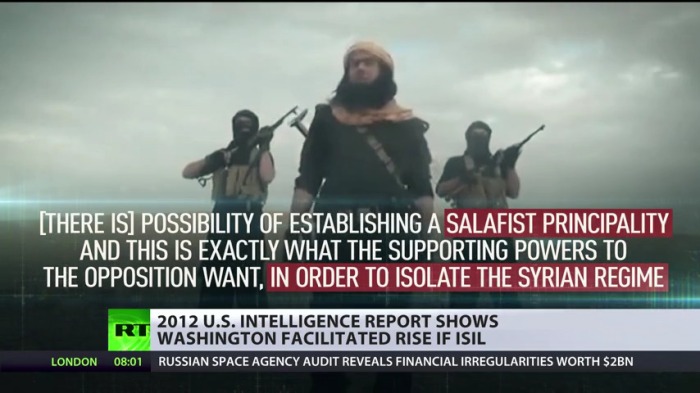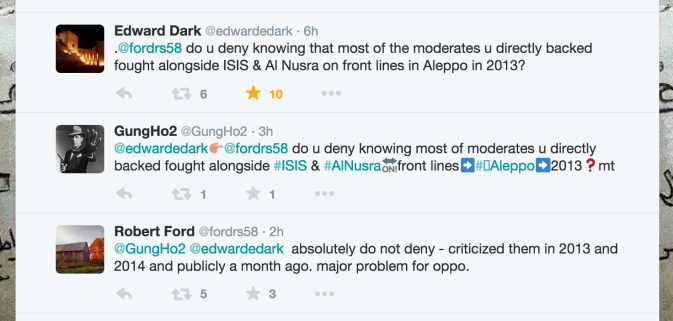 Not an “expert” or “analyst”: Me (left) with my buddy on one of many visits to Maaloula.
Not an “expert” or “analyst”: Me (left) with my buddy on one of many visits to Maaloula.
Would you be surprised to learn the think-tank and media “expert” community is often dominated by people who have never stepped foot in the countries of their expertise?
I’VE BECOME INCREASINGLY ALARMED at the number of “experts” and professional analysts occupying influential positions in the public sphere, who supposedly help interpret Syria for us, but who have little actual experience (if any at all) in Syria. Add to that the fact that many of these very “experts” don’t speak Arabic (which should be the minimal requirement for being considered a Middle East expert or professional analyst), which for most respectable postgraduate Middle East studies programs is an absolute minimal qualification.
I myself would never claim to be an expert, but I do have something which I’m constantly surprised to learn that many of the foremost pundits and public experts lack: a significant amount of time spent in country.
A couple of years ago my colleagues and I began writing about Syria not necessarily because we were enthused to do so or had a lot of time on our hands (we all have busy teaching schedules), but because the narrative which dominated major media and other public forums was so atrocious, so full of very simple errors, that audible laughs would often result upon us hearing the reporter on the TV screen (whether this was a FOX, CNN, NBC reporter, etc…) offer up utter falsehoods alongside whatever think tank panelist happened to be there giving the lies “credibility” and air of authenticity (ex: “the Syrian regime is Shia” is something heard a lot back then.)
We would see deeply flawed “news” about events on this or that street inside this or that village in Syria and felt compelled to at least vent our frustration through writing articles which few might ever see. Our “expertise” was not bookish or necessarily based on formal credentials, but we simply tried to “write what we know” from having stood on “this or that street” many times or having lived in “this or that village” at some point a few summers prior.
For example, my colleague Dr. Tim Heckenlively one day saw one of Anne Barnard’s (Beirut bureau chief for the NY Times) standard propaganda pieces in “the paper of record” on the Battle of Maaloula and knew it to be false based simply on having physically stood in the town. At first we waited and figured that surely somebody working for a major newsroom who had been to Maaloula, and knew the topography there, would point out Barnard’s glaring errors concerning the source of the shelling and destruction of churches. Surely somebody out there personally knew Mother Pelagia Sayyaf (who had been held at gunpoint by rebels, and forced to make a propaganda video) and understood she was being paraded in front of the camera under duress (Barnard and others would promote the narrative that the FSA/Nusra forces were “liberating” the ancient Christian town).
But a much needed corrective never appeared outside of independent media. Tim knew Maaloula and Mother Pelagia quite well and was easily able to deconstruct Barnard’s false report (which she wrote far from Maaloula in Beirut). While Tim’s article never made it into papers or onto big news sites, it was promoted and appreciated by some true experts who’ve actually been to Maaloula (and ironically, the article was “favorited” by Barnard herself; it should further be noted that, as As’ad AbuKhalil routinely points out, Barnard doesn’t know Arabic). This case of Maaloula is but an old example of something I’ve seen play out many times since then.
Stephen Kinzer made waves recently for his article “The Media are Misleading the Public on Syria” published in The Boston Globe. Its brilliance lies in articulating how the media and experts keep getting Syria so wrong from a “media culture” perspective (for lack of a better term). Kinzer breaks down the corporate media “machinery” and its process which continues to ensure that bad analysis makes it to the top:
Under intense financial pressure, most American newspapers, magazines, and broadcast networks have drastically reduced their corps of foreign correspondents. Much important news about the world now comes from reporters based in Washington. In that environment, access and credibility depend on acceptance of official paradigms. Reporters who cover Syria check with the Pentagon, the State Department, the White House, and think tank “experts.” After a spin on that soiled carousel, they feel they have covered all sides of the story. This form of stenography produces the pabulum that passes for news about Syria.
Yes, this means you too can be considered a Middle East “expert” so long as you get the right internship in the right DC beltway or NYC newsroom or think-tank. Forget about the days of getting your start trekking around the region of your expertise, getting to know the people, language, and customs…you can even become a media darling from the comfort of your own couch without ever having to apply for a passport!
Kinzer’s article has struck a deep chord (esp. as it was published in a visible, major paper) with biting lines like these:
Americans are said to be ignorant of the world. We are, but so are people in other countries. If people in Bhutan or Bolivia misunderstand Syria, however, that has no real effect. Our ignorance is more dangerous, because we act on it.
Kinzer is shining a spotlight on this whole sham enterprise from the perspective of a veteran foreign correspondent who has spent decades inside the media establishment (he himself is not claiming to be an expert on Syria, but he is an expert on the ills of newsroom culture). The whole process whereby a certain orthodox view of a foreign conflict gets entrenched, and from that point on must remain unquestioned, is indeed dangerous. As I wrote before: “American assumptions never line up with Eastern realities, yet our power combined with ignorance continues to sow disaster.”
Ironically, Kinzer’s point about reporters/analysts “not being over there” and the ignorance that results was given confirmation in the example of the very first person to attempt a point-by-point critical attack of Kinzer’s article. UK-based Kyle Orton wrote his “Assad and the Academics: Disinformation in the Modern Era” as a direct response to Kinzer.
Surprisingly (or maybe not so surprising), Orton has been published and quoted widely in multiple international and mainstream outlets. He recently had a New York Times op-ed piece called “How Saddam Hussein Gave Us ISIS” (which also ran in the print edition), wherein he argues that U.S. intervention and occupation in Iraq had little if anything to do with the rise of ISIS (elsewhere he’s argued the “Assad behind ISIS” conspiracy theory, long ago debunked by real experts).
Orton’s NYT bio is nice and official sounding: “Kyle W. Orton, a Middle East analyst, is an associate fellow at the Henry Jackson Society, a London-based foreign policy think tank.” But a rebuttal of Orton’s NYT piece written in Foreign Policy has it right when it leaves him simply as “blogger Kyle W. Orton.” The FP article authors Samuel Helfont and Michael Brill used their knowledge of…ya know…Arabic to analyze Iraqi archives and quickly proved Orton’s claims to be baseless:
These depictions are inaccurate and dangerously misleading, as documents in the Iraqi archives and at Hoover Institution’s Ba’ath Party records make clear. Our rigorous study of those records has found no evidence that Saddam or his Baathist regime in Iraq displayed any sympathy for Islamism, Salafism, or Wahhabism.
I too was at first under the impression that Orton must have some level of serious training or knowledge of Syria or Iraq until I realized he’s stepped foot in neither country (which he in so many words admitted to me directly).
Orton’s own bio on his blog includes the following: “After a misbegotten degree in zoology (biology), I completed a social science Masters in Humanitarian Studies at the Liverpool School of Tropical Medicine…”. Little more needs to be said, other than the good news for anyone with aspirations of being published in the New York Times: at present they must be desperate for contributors, or at least writers that can tow the line. Again, one need not leave their couch.
I admit that finding in Orton a prime example of Stephen Kinzer’s fundamental point is perhaps going after “low hanging fruit” but I’ve encountered this too many times in Syria discussions (though the most absurd case confirming Kinzer’s article is “Rocket Man” Elliot Higgins…and yes the following are real sentences about him written in The New Yorker, not The Onion: “Although Higgins has never been to Syria, and until recently had no connection to the country, he has become perhaps the foremost expert on the munitions used in the war… When he doesn’t recognize a weapon, he researches it, soliciting information from his many followers on Facebook and Twitter.”).
I’ll leave off with the below exchange I had with Orton, wherein I realized that he was making simple mistakes for lack of direct experience that would be impossible to make for even the casual backpackers who used to fill up the youth hostels of Damascus back in better days. Anyone who has spent even as little as a week in Syria anytime in the past decade (or more) knows of a certain long-standing custom of the Syrian presidency on all major religious holidays like Christmas and Easter.
When I realized Orton’s confusion came from never having stepped foot in Syria, I said: “[You] Would know this if you had experienced Syria”…Orton of course changed the subject. And nothing more needs to be said.



